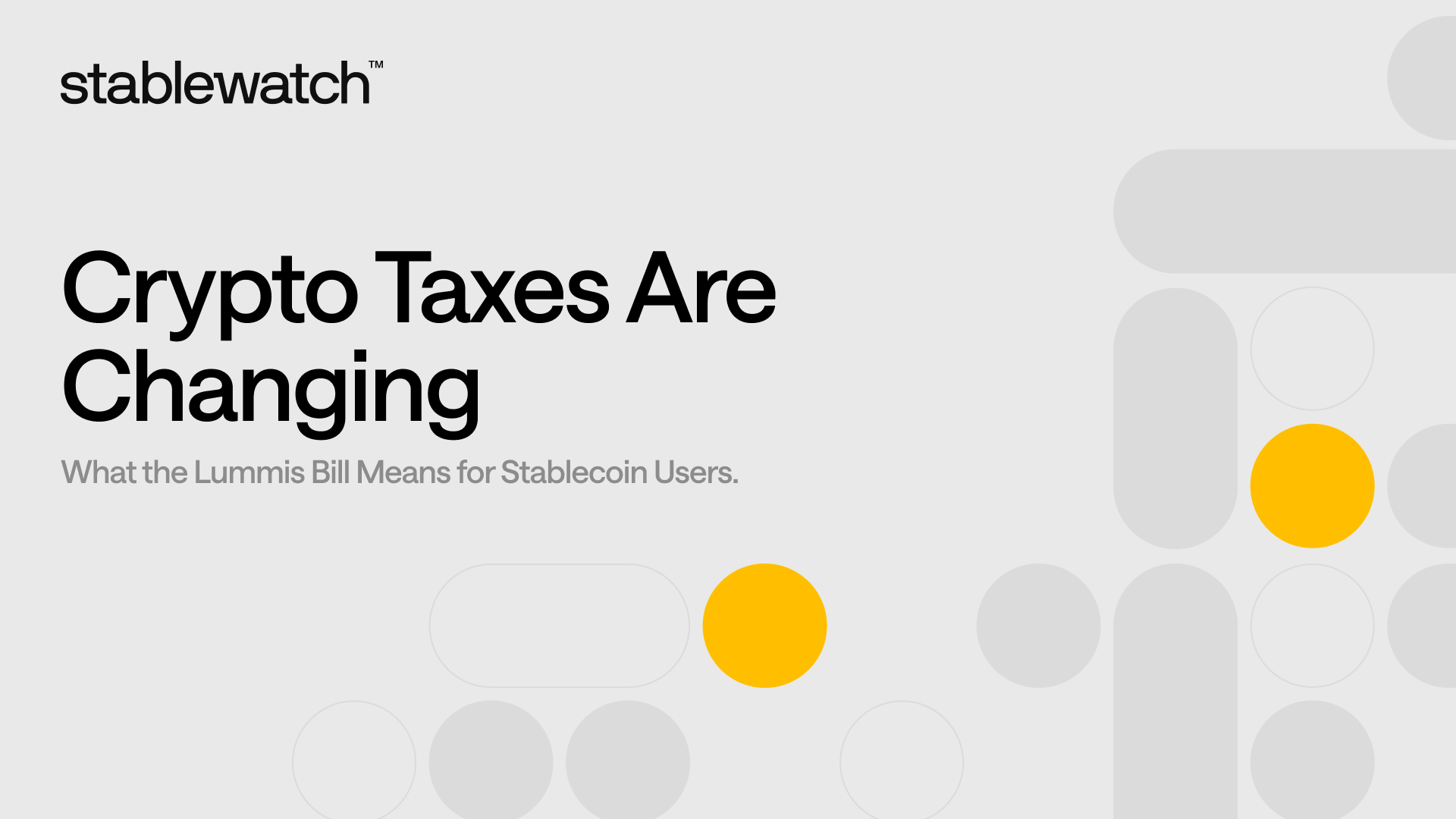
Crypto Taxes Are Changing: What the Lummis Bill Means for Stablecoin Users
A new US Senate Proposal could significantly change how everyday crypto users are taxed. Under the bill introduced by Senator Lummis on July 3, 2025, payment stablecoins would be treated by the IRS as cash equivalents, and excluded from de minimis exemptions applicable to other digital assets. The bill also proposes to defer taxes on staking and mining rewards until sale, but does not impact taxation of yield coming from YBSs (yield-bearing stablecoins). Here’s what stablecoin users need to know.
A Narrow View of Stablecoins - Defining Payment, Ignoring Yield
Unlike other recent legislative efforts in the US (see more in our blog post on GENIUS and Clarity Acts), this bill doesn’t prohibit yield-bearing stablecoins - it focuses on tax classification, not on regulating stablecoins’ design. Yet the definition of payment stablecoins mirrors those in GENIUS and Clarity Acts, which frame payment stablecoins as fully backed, fiat-referenced tokens. Lummis’ proposal adopts akin definitional frameworks as the GENIUS Act, reinforcing regulators’ assumption that payment stablecoins are meant to serve as cash-like instruments. Yield-bearing stablecoins are not separately defined or even recognized in the proposal and do not benefit from any tax deferrals or exemptions.
No IRS Relief for Stablecoin Users
Under the Lummis’ Proposal, payment stablecoins (like USDC) are treated much like cash equivalents. Transactions involving payment stablecoins, even small purchases, are not eligible for the bill’s $300 de minimis exemption. The exemption only applies to the gains from the dispositions of digital assets for personal purchases of goods or services. It does not apply where the disposition is in exchange for cash, cash equivalents (such as payment stablecoins), or other digital assets, likely excluding swaps and redemptions. Payment stablecoins are meant to behave like dollar substitutes, and forcing taxpayers to account for minuscule transactions seems counterproductive.
The bill also keeps stablecoins out of new wash-sale restrictions (which stop people from claiming tax losses on assets they immediately repurchase) acknowledging their low volatility, but it doesn’t offer any tax relief for stablecoin use in everyday payments.
Good News for Validators, Not So Much for Stablecoin Yield
Lummis’ bill also proposes to defer tax on mining, staking, airdrops, and forked tokens until the year of sale, replacing the current rule that taxes such rewards upon receipt. However, the bill doesn’t define staking, leaving uncertainty around whether ancillary rewards like validator fees or delegated staking income would qualify for deferral.
Under the current proposal, tax deferral applies only to income earned from validation of blockchain transactions. This narrow scope likely excludes yield-bearing stablecoins holders, who may receive staking-based yield but are not necessarily validators themselves. As a result, YBS payouts would generally be taxed as ordinary income when received, not deferred like direct staking rewards. In short, only active blockchain validation income gets the special tax deferral, whereas passive crypto income, such as returns distributed through yield-bearing stablecoin models or pooled staking would remain taxed under normal rules.
Where this Leaves Us
Lummis’ bill clarifies certain key tax treatment questions, and aligning stablecoin definitions with other emerging legal frameworks like GENIUS or Clarity. While limited in scope, it establishes foundational rules for how elementary blockchain activities are taxed. In the crypto world, even a small step towards legal clarity is a stable improvement towards greater legal certainty.
Sources:
- Senator Lummis Pushes Making Small Crypto Transactions Tax-Free in Big Beautiful Bill, Unchained, July 3, 2025.
- CryptoTaxGuy [Jason Schwartz] on the One Big Beautiful (Crypto Tax) Bill, X (Twitter), June 9, 2025.
https://x.com/CryptoTaxGuyETH/status/1932167858060177569
- Lummis Crypto Tax Reform Bill, U.S. Senate, July 3, 2025.
https://www.lummis.senate.gov/wp-content/uploads/Lummis-Crypto-Tax-Bill.pdf
- Crypto Tax Amendment Dropped from Senate’s Big Beautiful Bill, But Sen. Lummis Plans to Keep Pushing, The Block, July 2, 2025.
- The One Big Beautiful (Crypto Tax) Bill, Cahill Gordon & Reindel LLP, June 11, 2025.
